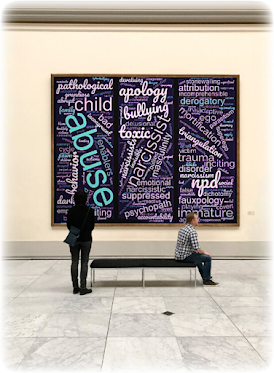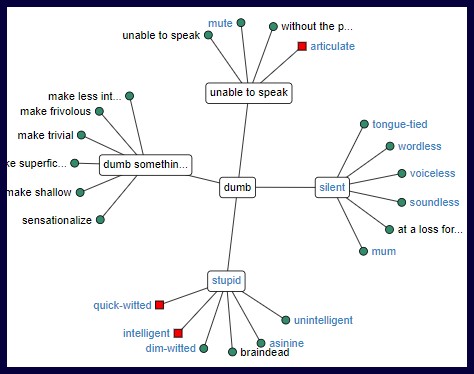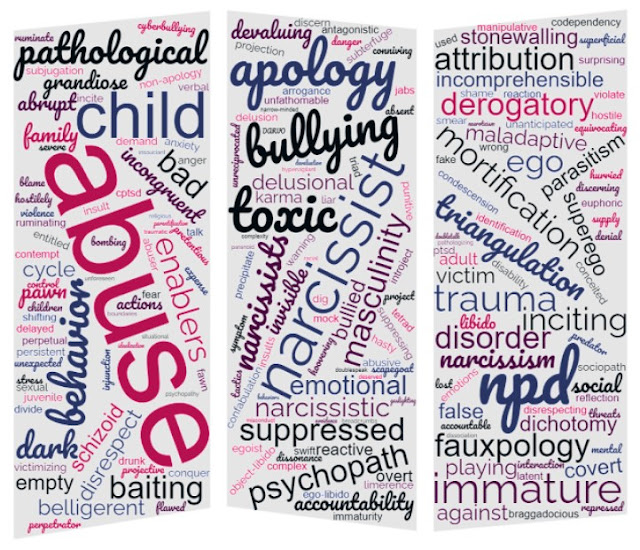
"A Pɪᴄᴛᴜʀᴇ ɪs Wᴏʀᴛʜ ᴀ Tʜᴏᴜsᴀɴᴅ Wᴏʀᴅs" "ᴀ Tʜᴏᴜsᴀɴᴅ Wᴏʀᴅs ᴀʀᴇ ᴡᴏʀᴛʜ ᴡᴀʏ ᴍᴏʀᴇ ᴛʜᴀɴ ᴛʜᴇ ᴘɪᴄᴛᴜʀᴇ."
~ Wᴏʀᴅs ᴀɴᴅ Tᴇʀᴍs Gʟᴏssᴀʀʏ Pᴀɢᴇs
~ Gloss.O.P.Q ~ Gloss.R.S ~ Gloss.T ~ Gloss.U.V.W.X.Y

C, is for,,
- CATHEXIS =
- CATFISHING NARCISSIST = Narcissistic Scammers Online.
- CATFISHING SOMEONE = Narcissistic Scammers Online.
- CHEAT =
- CHEATER =
- CHILD BEHAVING JUVENILE =
- COMPASSION FATIGUE = What is compassion fatigue? Compassion fatigue Opens a new window in the cost of caring for others or for their emotional pain, resulting from the desire to help relieve the suffering of others. It is also known as vicarious or secondary trauma, referencing the way that other people's trauma can become their own.
- CONSCIENTIOUS PERSON = Conscientious people tend to be efficient and organized as opposed to easy-going and disorderly. They tend to show self-discipline, act dutifully, and aim for achievement; they display planned rather than spontaneous behavior; and they are generally dependable.
- CONSCIENTIOUSNESS = Conscientiousness is defined as individual differences in the propensity to follow socially prescribed norms for impulse control, to be goal-directed, planful, able to delay gratification, and to follow norms and rules (Roberts, Jackson, Fayard, Edmonds, & Meints, 2009). / Conscientiousness is the personality trait of being careful or diligent. Conscientiousness implies a desire to do a task well, and to take obligations to others seriously. Conscientious people tend to be efficient and organized as opposed to easy-going and disorderly.
- CODEPENDENCY =
- COGNITIVE COMPLEXITY NESTING =
- COMFORTER =
- COMPREHENSIBLE =
- CON =
- CONCEITED PERSON =
- CONDESCENSION =
- CONFABULATION =
- CONGRUENT =
- CONNIVING =
- CONTEMPT =
- CONTEMPTIBLE =
- CONTEMPT OF COURT =
- CONTEMPTUOUS = Showing signs of contempt; scornful, disdainful, disrespectful, insulting, insolent,
mocking, sneering, taunting, scathing, condescending, arrogant, cavalier, high and mighty, vain, on one's high horse. - CONTROL TACTICS =
- COVERT NARCISSIST =
- CREATING DRAMA =
- CRITICAL =
- CROOK =
- CROOKED =
- CUNNING = Crafty, guileful, devious, sly, scheming, tricky, slippery, manipulative, deceitful, deceptive, duplicitous, shrewd, clever, ingenious, fiendish, sneaky,
D, is for,,

- DADDY ISSUES =
- DARK EMPATH =
- DARK TETRAD =
- DARK TETRAD OF NARCISSISM =
- DARK TETRAD VS DARK TRIAD
- DARK TRIAD =
- DARK TRIAD OF EMPATHY =
- DARK TRIAD OF NARCISSISM = =
- DARVO = DARVO: Deny, Attack, Reverse Victim Offender
- DECEPTIVE =
- DEFENCE MECHANISM =
- DEFENCE MECHANISM DISPLACEMENT =
- DEFENCE MECHANISM PROJECTION =
- DEFENCE MECHANISM PSYCHOLOGY =
- IMMATURE DEFENCE MECHANISM =
- SUBCONSCIOUS DEFENCE MECHANISM =
- DEFLECT =
- DEFLECT BLAME =
- DEFLECTION =
- DEFLECTION PSYCHOLOGY =
- PROJECTION VS DEFLECTION = Deflection is similar to projection, in that it involves putting a negative focus on somebody other than ourselves. But when a person deflects, they are consciously aware of the negative characteristic in themselves, whereas in projection, this awareness is not present (Freud, 1956).
- DEHUMANIZATION =
- DELUSION =
- DELUSIONAL =
- DELUSIONAL FALSE SELF =
- DELUSIONAL GRANDIOSE SELF =
- PERPETUAL DELUSION = Persistent Delusional Disorder
- DENIAL =
- DEROGATORY =
- DEVALUATION =
- DICHOTOMY =
- DIG = Slang, Insult
- DISCERNING = To discern right from wrong.
- DISSOCIATION =
- DIVIDE AND CONQUER =
- DOUBLESPEAK NARCISSIST =
E, is for,,

- ECHOISM =
- EGO =
- EMOTIONAL INTELLIGENCE = Self-awareness, Self-regulation, Motivation, Empathy, Understanding emotions, Social skills, and too many more to write here right now.
- EMPATH = An empath is a person highly attuned to the feelings and emotions of those around them. Empaths feel what another person is feeling at a deep emotional level. Their ability to discern what others are feeling goes beyond empathy, which is defined simply as the ability to understand the feelings of others. Empaths are exceptionally sensitive to the emotions and frame of mind of nearby individuals. Empathy is a natural state that enables a person to build an emotional connection through cognition with other individuals. In rare cases, being an empath may refer to intensely heightened perceptions. Roughly 1% to 2% of people can feel sensations on their skin while watching someone else be touched, a phenomenon linked to empathy and known as mirror-touch synesthesia. There are three types of empaths: physical empaths, emotional empaths, intuitive empaths. Here are just some of the basic signs of being an Empath; they can sense other people's emotions easily. They're sensitive to coffee, alcohol, or other substances. They get anxious easily. They find crowded spaces overwhelming. They can't tolerate loud sudden noises. They hate clutter and hoarding. They don't like being rushed.
- AFFECTIVE EMPATHY = Affective empathy: This type of empathy involves having the ability to understand and share in another person's emotions without being emotionally stimulated yourself. Somatic empathy: This type involves having a physical reaction in response to what someone else is experiencing. Affective empathy refers to the sensations and feelings we get in response to others' emotions; this can include mirroring what that person is feeling, or just feeling stressed when we detect another's fear or anxiety. Your friend has endured a heartbreak. The significant other was not a good influence on your friend, however, so although you feel with your friend and feel sad (affective empathy), a part of you is also happy, as your friend's future is likely to become more positive.
- COGNITIVE EMPATHY = Empathy can be separated into two major facets. Cognitive empathy refers to the ability to recognize and understand another's mental state (part of theory of mind (ToM) or mentalizing) while affective empathy is the ability to share the feelings of others, without any direct emotional stimulation to oneself. Cognitive empathy, also known as empathic accuracy or perspective-taking, is a type of empathy that allows you to rationally understand another person's thoughts, feelings, and perspective. Cognitive empathy involves knowing how other people think and feel, while emotional empathy involves feeling another person's emotions. Although they are quite different, both cognitive empathy and emotional empathy are equally important for helping us form and maintain connections with others. Emotional intelligence may be linked to empathy. If you haven't developed this type of intelligence, you may also have low empathy. Being under prolonged stress may also lead someone to be less tolerant of other people's behavior and have lower cognitive empathy.
- DARK EMPATH = A dark empath is a person who understands another person's emotions but doesn't experience those feelings. Though they may pretend like they care about what you're going through, they would rather use your emotions to manipulate you. They use their understanding of your feelings to manipulate you. “Dark empaths are usually very skilled at showing their care and concern for others, but this is typically done with ulterior motives and is usually rooted in manipulation,” says Darren Moore, Ph. The Dark Empath personality has high levels of narcissism, psychopathy, Machiavellianism, and empathy. The Dark Empath is potentially more of a danger than a person with the Dark Triad traits. Dark Empath traits can be initially appealing because they create a superficially attractive person.
- EMOTIONAL EMPATHY = Emotional empathy is the practice of sharing an emotional experience with another person and truly understanding how they feel. This deep understanding of the other person's emotional state typically derives from similar experiences. Affective (or emotional) empathy is the ability to feel what others are feeling. If your spouse is stressed and sad, you might mirror those emotions. If a friend is jovial and upbeat, you might find yourself grinning as their happiness seems contagious. People with NPD can experience empathy. However, due to the nature of their disorder, their ability to feel emotional empathy is extremely diminished.
- EMPATHY = Understanding another person's experience by imagining oneself in that other person's situation: One understands the other person's experience as if it were being experienced by the self, but without the self actually
- HIGHLY SENSITIVE PERSON (HSP) = Those who are highly sensitive "are really kind, caring, compassionate, empathetic, genuine people who want to help others and the world," said sensitivity expert and psychotherapist Julie Bjelland, LMFT. An empath or highly sensitive person (HSP) is someone who experiences the emotions of others. Empaths have the unique ability to sense and absorb others' emotions, which typically makes them extremely caring, compassionate, and understanding people. Empaths have the ability to easily see another person's perspective. Most highly sensitive people display rare strengths in key areas of emotional intelligence, also known as emotional quotient (EQ) — the ability to recognize and understand emotions in themselves and others. These strengths including self-awareness and social-awareness.
- INTUITIVE EMPATHY = Intuitive empaths are rare, and they have the innate ability to understand how others feel. They can also tell when someone isn't loyal or lying with their intuition, like a superpower. Intuitive empaths are believed to be a unique kind of empath that combines empathy, or the ability to understand and share the feelings of others, with instinct and perception. This power works on a purely instinctual level: users don't have the usual filters as empathy, but spontaneously adopt to other's emotions, physical sensations, and psychological perspectives in their bodies making it more of an inherent part of themselves than an external ability. PHYSICAL EMPATHY = "Physical empathy is when you're attuned to other people's physical symptoms, and you tend to absorb them into your own body," says Dr. Orloff. This goes beyond naturally contagious gestures, like laughter and yawning. Physical empaths feel people's physical symptoms in their own body (much like emotional empaths experience other people's feelings). Empaths may feel the physical pain of others due to this intense physical empathy.
- SOMATIC EMPATHY = Somatic empathy is described as responding to pain and sorrow in others by physically experiencing the same pain through proximity to them. 1. This is an excellent signal to bring attention to and sense the plight of others before understanding their conditions. Somatic empathy is defined as feeling someone else's pain physically. For example, if you see someone hurt, you too might feel physical pain. Anecdotally, identical twins sometimes report that they know when the other has been hurt, which might be an example of somatic empathy.
- EMPTY SCHIZOID CORE =
- ENABLERS =
- FLYING MONKEYS = Enablers
- ENTITLED =
- ESCAPISM = Fantasy, fantasizing, dreaming, daydreaming, daydreams, illusion(s), fancy, imagination, flight(s) of fancy, pipe dreams, castles in the air, wishful thinking, pie in the sky. While the opposite of escapism is realism.
- ESCAPISM ADDICTION =
- ESCAPISM IN PSYCHOLOGY =
- ESCAPISM PSYCHOLOGY DEPRESSION =
- MALADAPTIVE DAYDREAMING =
- ETHICS =
- EQUIVOCATING =
- EUPHORIC RECALL =
- EYE FOR AN EYE =

~ WORDS AND TERMS GLOSSARY PAGES

- FYI: Last Words: Did you know?
 A recent meta-analysis of 437 studies found a strong relationship between narcissism and violence, where narcissistic individuals are more likely to commit acts of violence than their non-narcissistic counterparts. In order to be considered a psychopath, many other psychopathic symptoms such as a lack of attachment to others, superficial charm, dishonesty, manipulativeness and reckless risk-taking come into play.
A recent meta-analysis of 437 studies found a strong relationship between narcissism and violence, where narcissistic individuals are more likely to commit acts of violence than their non-narcissistic counterparts. In order to be considered a psychopath, many other psychopathic symptoms such as a lack of attachment to others, superficial charm, dishonesty, manipulativeness and reckless risk-taking come into play. - It's certain that psychopathic narcissists exist
 and here's the kicker: If a person has psychopathic traits, then they tend to have narcissistic and Machiavellian traits too. People with these personalities can't sense other people's feelings or see the world from any perspective apart from their own. They don't have a sense of conscience or guilt to stop them behaving immorally.
and here's the kicker: If a person has psychopathic traits, then they tend to have narcissistic and Machiavellian traits too. People with these personalities can't sense other people's feelings or see the world from any perspective apart from their own. They don't have a sense of conscience or guilt to stop them behaving immorally.
No comments:
Post a Comment